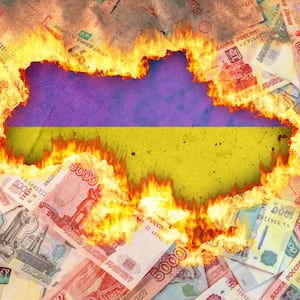Russia’s Trade Ministry has decided that white copy paper is now dangerous for Russians’ health and must be avoided at all costs.
“We have learned that this kind of gleaming, white office paper is harmful to human health,” Deputy Trade Minister Oleg Bocharov said, according to RIA Novosti.
“It turns out that paper with a rougher texture is better for your eyes.”
The reality is much simpler: Sanctions imposed on Russia after President Vladimir Putin ordered the illegal invasion of Ukraine in February has left paper manufacturers without whitening chemicals for paper. Normally, Russian manufacturers relied on imports from Finland to do the trick.
But the government is scrambling for a way to explain away the changes in paper quality—particularly because officials have yet to formally admit that Russian forces are fighting a full-fledged war and continue to claim that they are not attacking Ukrainian cities. Kremlin officials continue to tell Russians that their forces are simply a part of a “special military operation” meant to demilitarize Ukraine.
Already, pulp and paper mills in Svetlogorsk, Kondopoga, and Turinsk have begun shifting to produce paper successfully without the use of bleach as a result of sanctions, RIA Novosti reported.
It’s not the first time that the Russians have had to fudge the record in recent days due to struggles following the invasion.
McDonald’s exited Russia in May following Putin’s decision to launch the offensive into Ukraine. While Russia’s replacement for McDonald’s has been up and running for weeks now, the new chain, called “Delicious, Full Stop,” just announced this week it will no longer always be able to serve french fries—due in part to a bad Russian potato crop last year, and in part due to post-invasion supply chain issues that have hampered potato imports, according to RBC.
Last year was “a lean year for potato varieties” in Russia, the company said, RBC reported.
“There are certain problems,” a member of the State Duma's agrarian committee, Sergei Lisovsky, reportedly said. “McDonald's and everyone who sold these french fries forced them to use imported varieties, although there are also our normal Russian varieties.”
But the imported varieties don’t appear to be helping that much, in some cases.
Problems with potatoes in Russia due to Putin’s decision to fight a war in Ukraine abound. McCain Foods, the largest producer of french fries in the world, stopped shipping all of its products to Russia after the Ukraine invasion. McCain Foods, a Canadian company, also announced that it was halting construction of its production facility in Tula Oblast in Russia.
Since the invasion, the McDonald’s wannabe has had trouble importing potatoes from usual suppliers in Belgium and Poland, too, according to RTVI.
But Russia’s Agriculture Ministry is hitting back at “Delicious, Full Stop,” saying everything is just hunky-dory.
“We’ve got potatoes, full stop,” the ministry said on Telegram. “The Russian market is fully provided with potatoes.”
The automotive industry is feeling the crush of sanctions as well. Popular Russian car company Avtovaz had to stop production of some cars earlier this year because it could not adequately source certain parts given foreign sanctions, NBC News reported. But this time, the Russians barely tried to justify the problem.
Instead of producing cars with the right parts, they decided to just pump out cars without key safety mechanisms. The company decided to restart production and is now producing cars without safety features like air bags, anti-lock braking systems, and emergency retraction locks on seat belts.
The excuses go on and on. Russia typically hosts a splashy version of Davos, what Russia calls the St. Petersburg International Economic Forum (SPIEF). But this year, Russian experts and officials gathered for the confab not to jumpstart investment in Russia, as is usually the focus, but rather to lament sanctions at a significantly diminished, subpar conference. The most notable guests included Russian allies like Belarusian President Alexander Lukashenko. The delegation of honor was from Egypt.
Russian officials could barely even admit the war was going on at panels meant to address the poor economic conditions in Russia that have resulted from the conflict. Instead of addressing the war head-on, they skirted the issue in event descriptions by suggesting there were “new conditions” affecting the economy.
The government’s explanation? That it’s difficult to get to Russia. “It is difficult to get to St. Petersburg for objective reasons,” a foreign policy adviser to Putin said.








